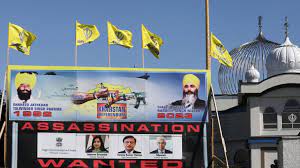OTTAWA (Reuters): The June murder of a Hardeep Singh Nijjar, a Sikh separatist leader, in Canada has triggered new diplomatic tensions between Ottawa and New Delhi, with Canada saying it suspects India’s involvement in the killing and India calling the allegations “absurd”.
Here is what is known about Hardeep Singh Nijjar, the man at the centre of the row.
– Nijjar was born in 1977 in Jalandhar district in India’s northern state of Punjab and moved to Canada in 1997, where he worked as a plumber, according to the Khalistan Extremism Monitor of the New Delhi-based independent Institute for Conflict Management.
– He was initially associated with the Babbar Khalsa International (BKI) Sikh separatist group, according to India’s counter-terrorist, National Investigation Agency. New Delhi has listed BKI as a “terrorist organisation” and says it is funded by Pakistan’s Inter-Services Intelligence (ISI) spy agency, a charge Islamabad denies.
– Nijjar later became chief of the militant group Khalistan Tiger Force (KTF) and was “actively involved in operationalising, networking, training and financing” its members, according to a 2020 Indian government statement.
– New Delhi officially categorised him as a “terrorist” in the same statement, saying he was involved in “exhorting seditionary and insurrectionary imputations” and “attempting to create disharmony among different communities” in the country.
– For supporters demanding a so-called independent Sikh state of Khalistan, Nijjar was a prominent leader and a strong voice for the cause.
– He was elected head of the Guru Nanak Sikh Gurudwara, a Sikh place of worship, in Surrey, the Vancouver suburb where he lived. He held that position at the time of his death.
– Hardeep Singh Nijjar was shot dead outside the same gurudwara on the evening of June 18.
– Hundreds of people protested outside the Indian consulate in Vancouver after his murder, alleging foreign hands were involved in his death, local media reported at the time.







